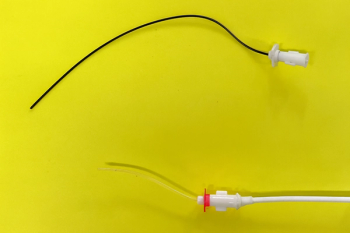
Urinary tract pointers (Proceedings)
Successful treatment of complicated urinary tract infections (UTI) requires adjustments to be made in the typical therapeutic plan for UTIs. Identification of complicated UTIs and other urinary tract-related circumstances requiring special therapeutic considerations will be reviewed.
1. Identifying special circumstances usually pays off in the long run.
Successful treatment of complicated urinary tract infections (UTI) requires adjustments to be made in the typical therapeutic plan for UTIs. Identification of complicated UTIs and other urinary tract-related circumstances requiring special therapeutic considerations will be reviewed.
2. The old ways may be good, but the new ways could be better.
Have you tried some of the newer antiemetics and appetite stimulants for pets with chronic renal failure? The use of these agents plus other newer therapies and diagnostic procedures you may want to try for urinary tract disorders will be reviewed.
3. Sometimes we create problems rather than solutions.
Standard treatment of congestive heart failure can sometimes result in acute renal failure. Tips for avoiding this circumstance as well as other iatrogenic causes of acute renal failure will be given.
4. Just when you think you have it figured out, along comes a cat.
Urine specific gravity in the cat doesn't always follow the usual rules of interpretation. This idiosyncrasy plus other feline peculiarities will be discussed.
5. Familiarity breeds success.
Being familiar with breed predispositions for specific urinary tract disorders often facilitates diagnosis and treatment. A brief overview of canine and feline breed-associated urinary tract disorders will be given. A table listing breeds of cats and dogs with familial renal disorders has been included in these notes.
Pointer Pearls
Pointers to remember about treating complicated UTIs:
• Complicated UTIs should be treated for a minimum of 30 – 45 days
• Complicated UTIs include the following circumstances:
o Intact, male dogs
o Presence of a treated or untreated concurrent predisposing disorder such as uroliths, neoplasia, neurologic deficits, anatomic defects, diabetes mellitus, or hyperadrenocorticism Administration of medication that interferes with successful microbial eradication
o Upper urinary tract infections
Alternative dissolution protocol for canine struvite uroliths:
• Feed a maintenance, non-calculolytic diet(e.g, Science Diet Adult Original {Hill's Pet Nutrition}, Dog Chow {Purina})
• Administer appropriate antibiotic therapy
• Administer the urinary acidifier d,l methionine (Methioform® - 100 mg/kg PO q12 hrs)
Prevention of iatrogenic acute renal failure:
• Identify at-risk animals
o Pre-existing renal disease
o Advanced age
o Renal hypoperfusion
o Electrolyte imbalances
• Provide adequate fluid support
• Take proper precautions when using potentially nephrotoxic or ischemia-inducing agents
o ACE-inhibitors Avoid use of furosemide or reduce furosemide dosage when used concurrently
o Consider administration of mannitol or dopamine by CRI
o Aminoglycosides-
- Use less nephrotoxic antibiotics when possible
- Give higher dose less frequently than standard regimen when renal function normal
- Give standard dose at increased interval when renal function impaired
- Correct electrolyte imbalances
- Avoid concurrent administration of furosemide
- Feed high dietary protein when possible
- Check urine sediment periodically
• NSAIDS- Avoid concurrent administration of furosemide
o Consider administering mannitol or dopamine by constant rate infusion
Considerations in diagnosing transitional cell carcinoma of the bladder:
Although cytology from a free catch or cystocentesis urine sample can sometimes give a strong indication of the presence of TCC, the transitional cells are affected by inflammation which can make interpretation difficult. Although a bladder tumor antigen test is available, results can be unreliable with glucosuria, proteinuria, pyuria, and hematuria. A definitive diagnosis can sometimes
be obtained through a fine needle aspirate and almost always obtained by surgical biopsy. However, the act of obtaining these samples by traditional means can seed neoplastic cells in other tissues. The safest way of obtaining a diagnosis with probably the least risk to the patient is by traumatic urethral catheterization or by using cystourethroscopy to obtain suitable histopathologic samples.
Alternative therapies for canine urethral sphincter mechanism/hormone responsive incompetence:
Usual medical treatment for urethral sphincter mechanism/hormone responsive incontinence involves administering phenylpropanolamine and/or an estrogen compound. Additional medical treatments which might be helpful include the administration of the alternative α-adrenergic agonist pseudoephedrine/ephedrine (1.2 mg/kg q 8 – 12 hrs PO) or the tricyclic antidepressant and α-adrenergic agonist imipramine (5 – 15 mg/dog q 12 hours PO). Imipramine increases sympathetic tone through inhibition of norepinephrine reuptake at the neuronal synapse. If medical therapy fails to control the patient's sphincter mechanism incompetence, periurethral collagen injections, colposuspension, or application of a hydraulic occluder could be considered.
FAMILIAL RENAL DISORDERS IN CATS AND DOGS
Newsletter
From exam room tips to practice management insights, get trusted veterinary news delivered straight to your inbox—subscribe to dvm360.





